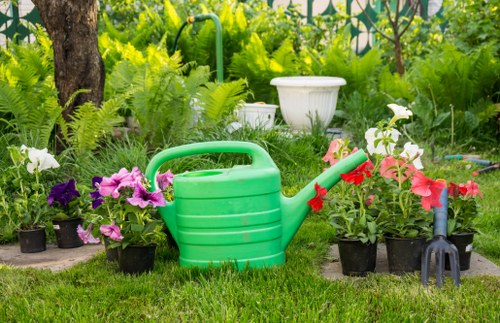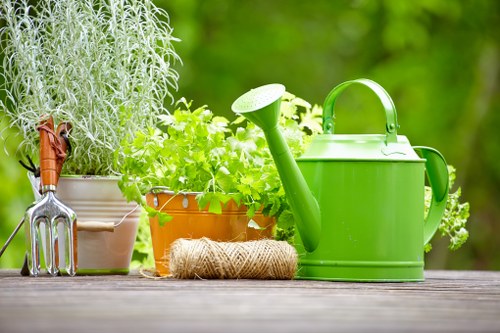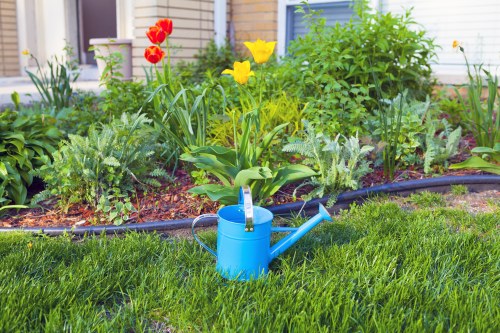Expert Garden Maintenance Services in Chingford

Maintaining a beautiful garden in Chingford requires dedication, expertise, and a deep understanding of the local climate and soil conditions. Whether you're a seasoned gardener or a novice, keeping your garden in pristine condition can be a rewarding yet challenging task. This article delves into the essential aspects of garden maintenance in Chingford, providing you with the knowledge and tips to ensure your outdoor space thrives all year round.
Chingford, located in the London Borough of Waltham Forest, boasts a temperate climate that supports a wide variety of plants and flowers. However, this climate also presents its own set of challenges, such as unpredictable weather patterns and specific soil types. Effective garden maintenance in this area involves a combination of regular care, strategic planning, and the use of appropriate gardening techniques.
Proper garden maintenance not only enhances the aesthetic appeal of your outdoor space but also promotes the health and longevity of your plants. From lawn care and pruning to pest management and seasonal planting, each aspect plays a crucial role in creating a vibrant and sustainable garden. In the following sections, we will explore these elements in detail, offering practical advice and professional insights to help you achieve garden excellence in Chingford.

The Importance of Regular Lawn Care
The lawn is often the centerpiece of any garden, providing a lush green backdrop for other plants and outdoor activities. In Chingford, maintaining a healthy lawn involves several key practices tailored to the local environment.
Grass Selection and Soil Preparation
Choosing the right type of grass is fundamental to a thriving lawn. In Chingford, cool-season grasses like fescue and ryegrass are ideal due to their resilience in temperate climates. Before planting, it's essential to prepare the soil by testing its pH levels and nutrient content. Amending the soil with compost or other organic matter can enhance fertility and promote strong root growth.
Regular Mowing and Trimming
Mowing your lawn regularly ensures even growth and prevents weeds from taking hold. It's recommended to mow the grass to a height of about 2.5 to 3 inches, allowing for adequate sunlight penetration and air circulation. Additionally, trimming edges and removing clippings can further enhance the lawn's appearance and health.
Fertilization and Weed Control
Fertilizing the lawn at appropriate intervals provides essential nutrients that support robust growth. In Chingford, a balanced fertilizer applied in the spring and autumn is typically sufficient. Effective weed control, whether through manual removal or the use of eco-friendly herbicides, is also vital to prevent competition for resources.
Proper lawn care not only creates a visually appealing landscape but also contributes to the overall ecosystem by supporting wildlife and reducing erosion. Investing time and effort into maintaining your lawn will pay off with a vibrant and resilient green space.

Strategic Pruning Techniques
Pruning is an essential aspect of garden maintenance that involves the selective removal of certain parts of a plant, such as branches, buds, or roots. This practice promotes healthy growth, enhances plant shape, and prevents potential issues related to overgrowth or disease.
When to Prune Different Plants
Timing is critical when it comes to pruning. Deciduous trees and shrubs are typically pruned during the dormant season in late winter or early spring. This timing minimizes stress on the plants and encourages vigorous growth in the upcoming season. Conversely, flowering shrubs may require pruning immediately after blooming to avoid cutting off future flower buds.
Tools and Techniques for Effective Pruning
Using the right tools is essential for precise and clean cuts. Sharp pruning shears, loppers, and saws are commonly used, depending on the size of the branches being removed. It's important to make cuts at a slight angle to prevent water accumulation and potential rot. Additionally, removing dead or diseased branches helps in maintaining plant health and reducing the risk of pest infestations.
Maintaining Plant Health and Aesthetics
Regular pruning not only keeps plants healthy but also enhances their aesthetic appeal. By shaping plants to your desired form, you can create a harmonious and organized garden layout. Pruning also improves air circulation within the plant canopy, reducing the likelihood of fungal infections and promoting better sunlight exposure.
Implementing strategic pruning practices is fundamental to sustaining a beautiful and healthy garden. It requires an understanding of plant biology and a keen eye for detail, ensuring that each plant contributes positively to the overall garden environment.

Seasonal Garden Maintenance Tips
Gardening is a year-round endeavor, with each season bringing its unique set of tasks and considerations. Understanding and adapting to these seasonal changes is crucial for maintaining a vibrant and resilient garden in Chingford.
Spring: Renewal and Planting
Spring marks the rebirth of garden life, making it an ideal time for planting new flowers, vegetables, and shrubs. Clearing away winter debris, preparing the soil, and applying compost can create a fertile environment for new growth. Additionally, this is the perfect time to divide perennials and transplant established plants to different areas of the garden.
Summer: Maintenance and Protection
During the summer months, garden maintenance focuses on watering, weeding, and protecting plants from excessive heat and pests. Installing mulch can help retain soil moisture and suppress weed growth. Regular monitoring for signs of stress or disease allows for timely interventions, ensuring that plants remain healthy and productive throughout the warmer seasons.
Autumn: Preparation and Cleanup
Autumn is a time to prepare the garden for the colder months. This involves raking fallen leaves, pruning overgrown plants, and planting bulbs for spring blooms. Applying a layer of mulch can provide insulation for plant roots, while also improving soil structure. It's also an opportune time to store garden tools and equipment, ensuring they're in good condition for the next gardening cycle.
Winter: Rest and Protection
Winter gardening focuses on protecting plants from frost and harsh weather conditions. Covering sensitive plants with frost cloths or moving potted plants to sheltered areas can prevent damage. Additionally, this is an ideal time to plan and design future garden layouts, reflecting on the successes and challenges of the past year.
Adapting to the rhythms of each season ensures that your garden remains healthy, beautiful, and productive throughout the year. By anticipating seasonal needs and responding proactively, you can create a sustainable and flourishing outdoor space.

Pest and Disease Management
Gardeners in Chingford often face challenges related to pests and diseases that can threaten the health and vitality of their plants. Effective management strategies are essential to prevent and address these issues, ensuring a thriving garden environment.
Identifying Common Pests
Understanding the common pests that affect gardens in Chingford helps in implementing targeted control measures. Some prevalent pests include aphids, slugs, snails, and fungal gnats. Each pest has its own behavior patterns and vulnerabilities, necessitating specific management approaches.
Natural and Chemical Control Methods
Integrating natural control methods, such as encouraging beneficial insects like ladybugs and predatory beetles, can effectively reduce pest populations without harming the ecosystem. In cases of severe infestations, organic or chemical pesticides may be necessary. It's important to choose products that are safe for the environment and non-toxic to beneficial organisms.
Preventative Measures and Good Practices
Preventing pest and disease issues is often easier than addressing them after they occur. Maintaining plant health through proper watering, soil management, and adequate spacing reduces vulnerability. Regular inspections and prompt removal of affected plant parts can also help contain potential outbreaks.
Effective pest and disease management ensures that your garden remains a healthy and enjoyable space. By staying informed about common issues and employing proactive strategies, you can safeguard your plants against potential threats.
Enhancing Soil Health
Soil quality is the foundation of a successful garden. Healthy soil supports robust plant growth, improves water retention, and fosters beneficial microbial activity. In Chingford, where soil conditions can vary, enhancing soil health is a critical component of garden maintenance.
Soil Testing and Amendment
Conducting regular soil tests provides valuable insights into nutrient levels and pH balance. Based on the results, gardeners can amend the soil with appropriate fertilizers, lime, or sulfur to achieve optimal conditions for plant growth. Incorporating organic matter such as compost or well-rotted manure enriches the soil and promotes a thriving microbial ecosystem.
Mulching Techniques
Applying mulch to garden beds helps retain moisture, suppress weeds, and regulate soil temperature. Organic mulches, like shredded bark or straw, gradually break down, adding nutrients to the soil. In addition to these benefits, mulch improves the overall appearance of garden areas, giving them a neat and finished look.
Crop Rotation and Companion Planting
Implementing crop rotation and companion planting practices can naturally enhance soil health and reduce pest pressures. Rotating plant families each season prevents nutrient depletion and disrupts pest life cycles. Companion planting, where certain plants are grown together for mutual benefit, can enhance growth and deter unwanted insects.
Maintaining healthy soil is essential for a flourishing garden. By understanding soil dynamics and employing appropriate techniques, you can create a fertile and supportive environment for your plants.
Contact us today to learn more about enhancing your garden's soil health and ensure your plants thrive in Chingford's unique climate.
Book your service now and let our team of experts assist you in achieving the garden of your dreams.